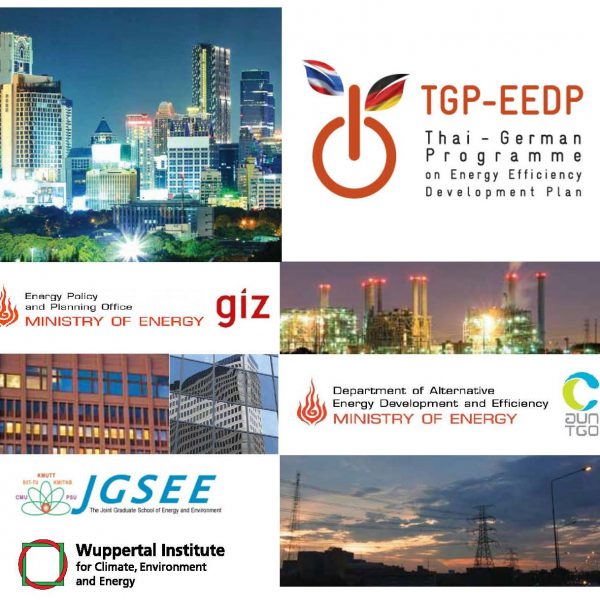FINISHED on 31 December 2016
BACKGROUND
Nowadays energy is at the heart of everybody’s quality of life and a crucial factor for economic growth and employment. Energy demand in Thailand is increasing continuously and depends heavily on energy imports due to limited domestic energy sources. Energy efficiency (EE) plays an important role in strengthening energy security, decreasing household expenditure and production costs, reducing import and trade deficits, and increasing competitiveness. EE also helps mitigating pollution and greenhouse gas (GHG) emissions which cause global warming and climate change. The Energy Policy and Planning Office (EPPO) was commissioned by the Ministry of Energy to establish an 20-year Energy Efficiency Development Plan (EEDP) before revising to be Energy Efficiency Plan (EEP) for the period from 2015 to 2036. The plan aims to reduce the energy intensity in Thailand by 30% until 2036 (baseline 2010).
OBJECTIVES
Supported and standardised energy efficiency contributes directly to CO2 emission reductions.
- To establish uniform baseline criteria for all energy efficiency measures and support the improvement of energy data management,
- To contribute to the development of new and improved energy standards,
- To strengthen existing support instruments and create additional value,
- To enhance and facilitate the use of climate relevant instruments for implementing the Energy Efficiency Plan.
APPROACHES
The BMUB IKI project ‘Thai German Programme on Energy Efficiency Development Plan (TGP-EEDP)’ aims at promoting energy efficiency in the industry and building sectors in Thailand. To achieve this, the project supports the implementation of the Thailand long term energy efficiency strategy (the 2011 Energy Efficiency Development Plan 2011-2030 and the updated Energy Efficiency Plan 2015-2036) based on standards and incentives which will have a direct impact on CO2 emission reduction. Examples of instruments to be developed under the EEDP are Energy Efficiency Indicators (EEI), the Standard Offer Programme (SOP), the Energy Efficiency Resource Standard (EERS), supportive instruments for high energy efficiency buildings and optimised ESCO services. The TGP-EEDP will also link the EEDP with climate policy by means of developing Nationally Appropriate Mitigation Actions (NAMA’s) on the basis of energy efficiency policies.
PROJECT EVENTS
Energy Efficiency Indicators (EEI)
01-02 Apr 2015: Second Training on Energy Efficiency Indicators
21 Aug 2014: Seminar on Final Results of Energy Data Analysis Phase 2: Energy Efficiency Indicators Development
24 May 2014: Interim Results of Energy Data Analysis Phase 2: Energy Efficiency Indicators Development
10 Feb 2014: Kick off Meeting Energy Data Analysis Phase 2: Energy Efficiency Indicators Development
17 Sep 2013: Stakeholders’ Meeting on Energy Data Analysis in Thailand
Energy Efficiency Resource Standards (EERS)
17 Dec 2015: Seminar on Energy Efficiency Resource Standards (EERS) “EERS experiences abroad and the utility perspective”
27 Aug 2015: Roundtable Meeting on “Energy Efficiency Resource Standards (EERS)
12 Jun 2014: Focus Group Meeting No. 1/2014: Energy Efficiency Resource Standards (EERS)
27 Mar 2014: Seminar on Energy Efficiency Resource Standards (EERS)
Building Energy Code (BEC)
03 Dec 2015: Seminar on ‘Analyzing Incentives and Financial Mechanisms to Promote High Energy Efficient Buildings in Thailand’
13 Oct 2015: M&E scheme for the Thai Building Energy Code
23 Sep 2015: Workshop on “Analyzing Incentives and Financial Mechanisms to promote High Energy Efficient Buildings in Thailand)”
18 Aug 2015: BEC Database Training
15 Jun 2015: Expert Meetings: Development of “Architectural Guidebook for High Energy Efficiency Building Design”
18 Mar 2015: Seminar on “Building Energy Labelling (Building No.5) to Support the Uptake of Building Energy Code”
Standard Offer Programme (SOP)
17 Dec 2014: Workshop on Design of the Standard Offer Program (SOP) Pilot
18 Jun 2013: Seminar on Standard Offer Programme (SOP)
Energy Service Company (ESCO)
24 May 2016: Workshop on “Framing the Roadmap for ESCO Facilitation Approach in Thailand”
19-21 Jan 2016: ESCO Training “Dynamic Investment Grade Calculation”
18-19 Nov 2015: Training on “ESCO Facilitation”
17 Nov 2015: Seminar on “Sharing Experiences on Facilitation Approach for ESCO Projects”
11 Sep 2015: Roundtable Meeting on ESCO Facilitation
24 Jun 2014: Facilitation Approach for ESCO Projects
Nationally Appropriate Mitigation Action (NAMA)
25 Jun 2015: Roundtable Workshop “Financial mechanisms to transform the ESCO market in Thailand: Discussion of the NAMA proposal”
10 Feb 2015: Focus-Group Meeting “Challenges & Financial Barriers to the development of ESCO market in Thailand”
21-22 Nov 2014: Workshop on Monitoring and Evaluation of Energy Efficiency Policies
14 May 2014: Workshop on Defining Suitable EE-NAMA and International Support Needed
26 Aug 2013: Introductory Workshop – NAMA: Conceptual Framework and Development
International Know-how Transfer Information & Capacity Building
16 Jul 2015: Prezi Training
01-02 Apr 2015: Second Training on Energy Efficiency Indicators
25 Nov 2014: Capacity Building & Training on “Monitoring and Evaluation of Energy Efficiency Policies”
31 Aug – 06 Sep 2014: Study Trip to Denmark and Germany “Energy Efficiency Policy and Implementation in industrial and building sector ”
13-15 Mar 2014: Training Workshop on Results-based Management
Other events
09 Jun 2016: TGP-EEDP 4th Steering Committee *(The last steering committee meeting)
28-29 Jan 2016: Final Planning Workshop 2016
29 Oct 2015: Focus group meeting on ‘Look back EEDP (2011-2030) and way forward to EEP 2015’
01 Oct 2015: Memorandum of Understanding (MoU) Signing Ceremony Regarding joint technical cooperation in Energy Efficiency in Building and ESCO facilitation approach between Electricity Generating Authority of Thailand (EGAT) and German International Cooperation (GIZ)
03 Mar 2015: Final-year review workshop of TGP-EEDP project
FINANCED BY
The German Federal Ministry for the Environment, Nature Conservation, Nuclear Safety and Consumer Protection (BMUV)
